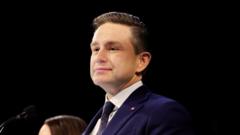The Canadian Conservative Party is facing a crisis as it reflects on a shocking electoral defeat that saw its leader, Pierre Poilievre, lose his own seat while the party failed to capitalize on a commanding 27-point lead in the polls. The Monday night election marked the Conservatives' fourth consecutive loss, despite garnering nearly 42% of the popular vote—their strongest showing since 2003. Internal tensions are visible as members attempt to navigate the fallout.
In the wake of disappointing results, Conservative candidates and supporters shared their confusion. Shakir Chambers, a party strategist, noted the overall dissatisfaction within the ranks. Poilievre is now expected to focus on unifying the party, especially ahead of crucial meetings to reassess strategy and direction without his presence in Parliament.
Poilievre has announced plans to run for a seat in an Alberta special election, triggered by the resignation of Conservative MP-elect Damien Kurek. Kurek expressed his hope that Poilievre would reclaim a position in the House of Commons, believing he represents an "unstoppable movement." Alberta is a stronghold for the Conservatives, increasing Poilievre's chances of success.
Yet, questions linger about Poilievre's leadership and backing from party members. While some, like Andrew Scheer, have rallied in his support, others, such as Jamil Jivani, have criticized Ontario Premier Doug Ford for distracting from the campaign and undermining their chances. Despite Ontario's provincial Conservative party’s autonomy, Jivani's remarks highlight underlying fractures within the broader Conservative movement.
Complicating matters, Ford did not campaign for Poilievre, leading to accusations of betrayal. Some party figures argue that Poilievre's confrontational style alienated potential voters, particularly in Eastern Canada, while resonating more with Western constituents. Kory Teneycke, Ford's campaign manager, emphasized the need for the Conservative Party to unite various factions for future success.
Others have pointed out the stark differences in Conservative identities across Canada, suggesting that healing the divisions will require significant effort from Poilievre's leadership. As discussions continue, Ford alluded to the simplicity of the solution: establishing better communication could bridge the rifts.
The Conservative Party now faces critical choices about its direction and unity, as it contemplates lessons learned from this electoral defeat. With the next election looming, the urgency for constructive dialogue and strategic planning has never been clearer.





















